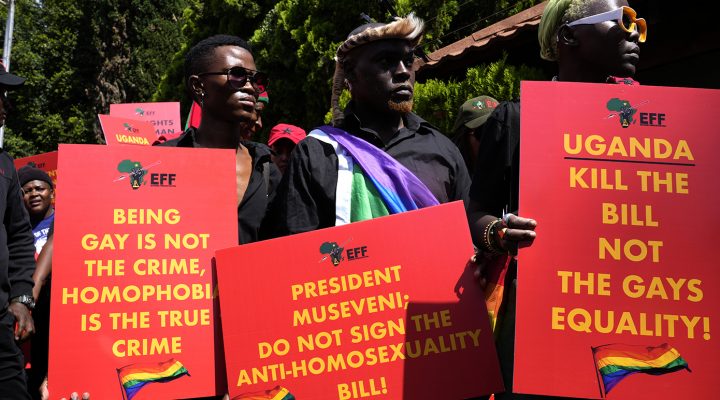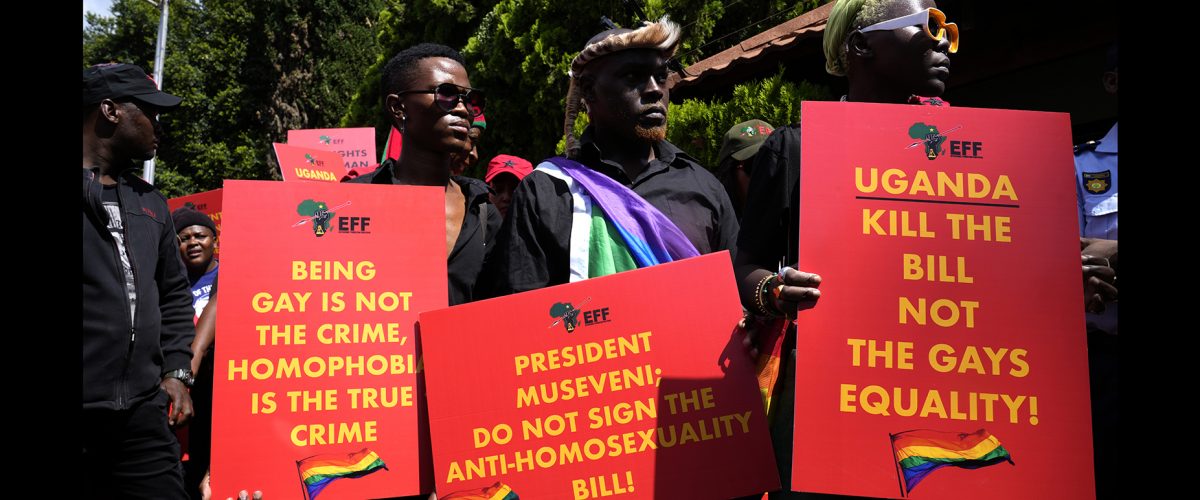When a prominent Southern Baptist pastor quotes Levitical law prescribing the death penalty for participants in gay sex, should that be interpreted as calling for capital punishment for gay people in America today?
Apparently not, according to Florida pastor Tom Ascol and his defenders. But that’s an argument his critics aren’t buying.
In response to a severe new anti-gay law passed in Uganda, U.S. Sen. Ted Cruz, R-Texas, tweeted May 29: “This Uganda law is horrific & wrong. Any law criminalizing homosexuality or imposing the death penalty for ‘aggravated homosexuality’ is grotesque & an abomination. ALL civilized nations should join together in condemning this human rights abuse.”
Ascol, head of the Southern Baptist Convention Calvinist group known as Founders Ministries and a candidate for SBC president last year, rebuked Cruz with his own tweet in response: “Tell it to God, Ted.”
Ascol then quoted Leviticus 20:13 — “If a man lies with a male as with a woman, both of them have committed an abomination; they shall surely be put to death; their blood is upon them.”
And he added: “Was this law God gave to His old covenant people ‘horrific and wrong’?”
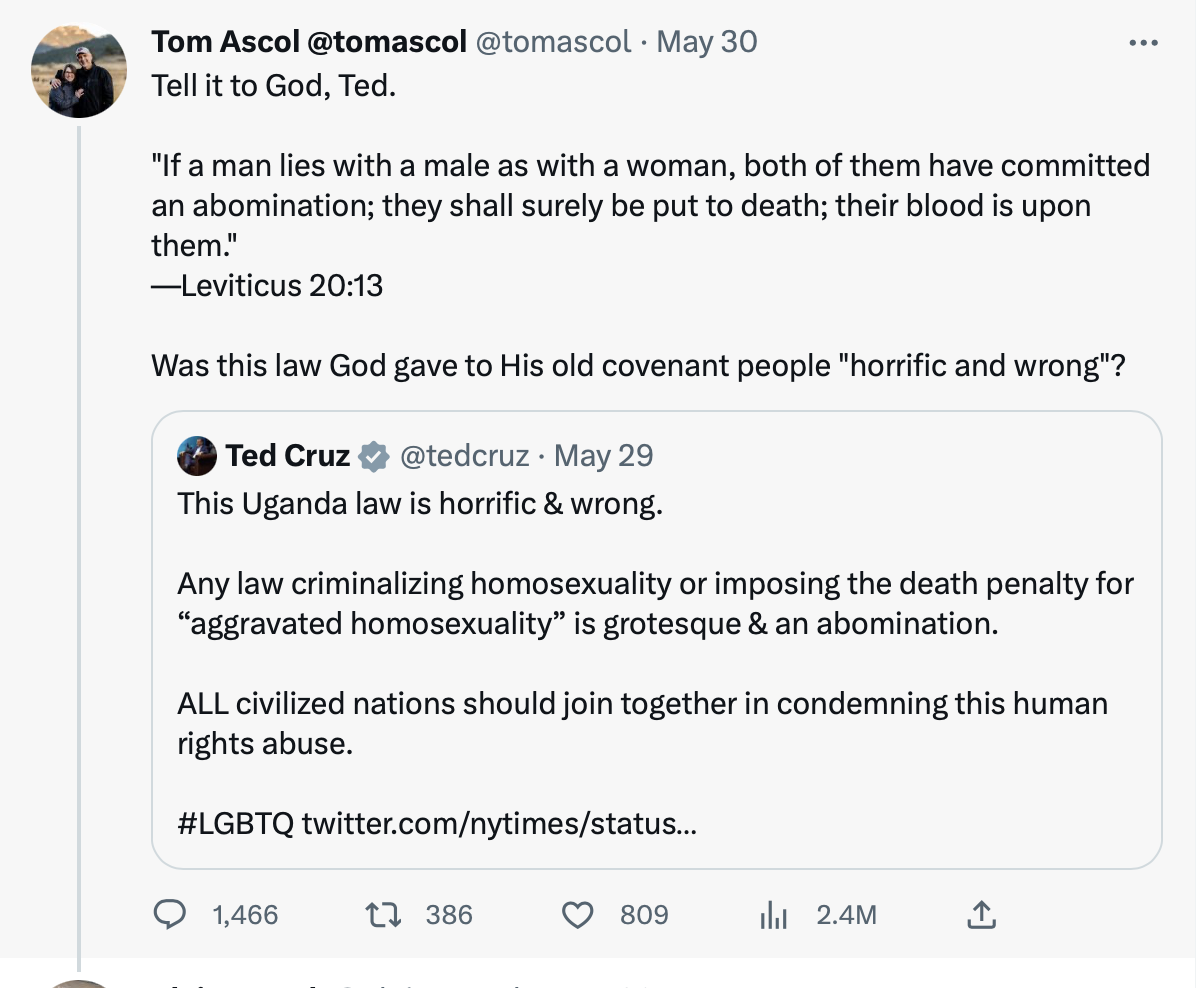
The 1,400 comments on Ascol’s tweet included some thanking him for taking a “biblical” stand and others expressing outrage that he believes gay people should be put to death in 2023.
But Steven Hasty, leader of a group called Families for a Biblical Worldview, came to Ascol’s defense: “Many of you are missing the point. If you’re understanding this tweet to mean Pastor Tom thinks we should start executing homosexuals, you’re missing it. Instead, he’s challenging the standards of Cruz. Where does Cruz derive his standards?”
To which Ascol responded: “You are exactly right. Some people don’t read carefully. Others, evidently, don’t reason well. Thanks for clarifying & accurately expressing what I *actually* wrote.”
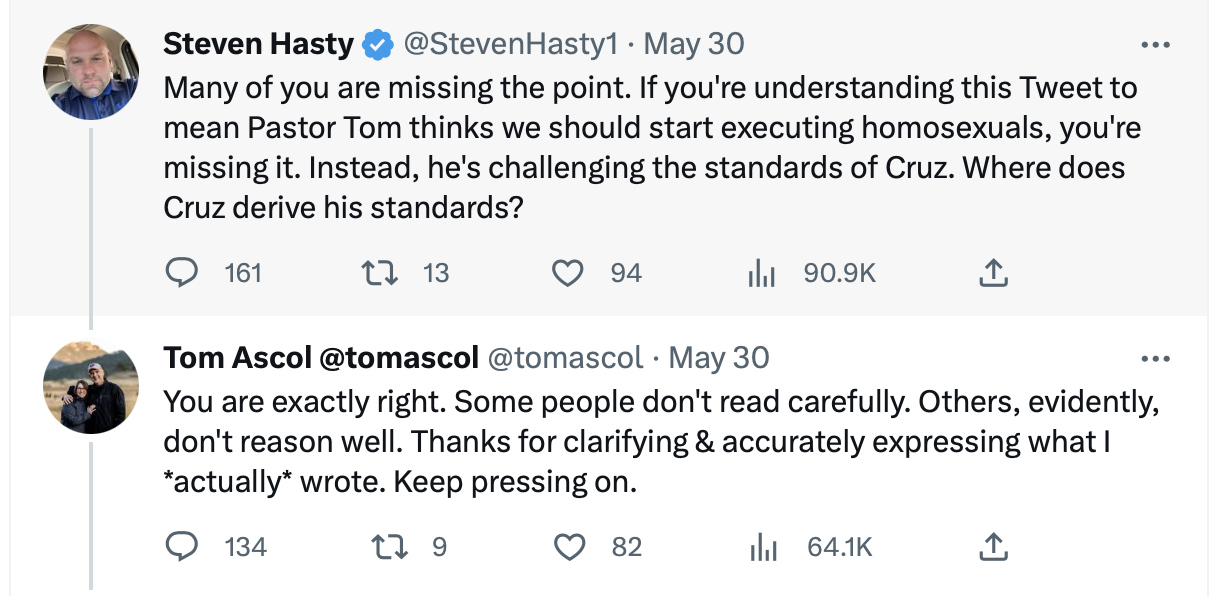
That was not sufficient explanation for some, who read what Ascol actually wrote as clearly applying Old Testament law to a modern context.
“I do not personally know Tom Ascol or Ted Cruz. What I do know, though, is that words matter and words have meaning,” said Brian Henderson, pastor at First Baptist Church of Denver and executive director of Association of Welcoming and Affirming Baptists.
“Without accusing Rev. Ascol of saying something he didn’t mean, a man of words such as he is, he could have been more explicit if he wasn’t suggesting harm to LGBTQ folk,” Henderson added. “And while I never thought I’d say something so affirming of Sen. Cruz, I am grateful for his public statement against this most recent Ugandan law. I hope his words are indeed genuine and are not politically positioning him for the next election cycle.”
“A man of words such as he is, he could have been more explicit if he wasn’t suggesting harm to LGBTQ folk.”
Neither Ascol nor Cruz are known as friends to the LGBTQ community. Some skeptics accused Cruz of orchestrating his tweet to appeal to business interests at the beginning of Pride month.
Ascol is well known as a strict biblical literalist and a proponent of a strident form of complementarianism, advocating for male headship in church and home. He and others in the SBC are outspoken critics of anything remotely associated with the LGBTQ community. They have been engaged in a crusade to discredit Guidepost Solutions, the secular firm hired to investigate sexual abuse in the SBC, because last year the firm put out a single tweet affirming its LGBTQ employees.
Ascol also is a public supporter of Florida Gov. Ron DeSantis, who now is a 2024 presidential candidate, and who often is in political competition with Cruz.
What happened in Uganda?
Earlier this week, Ugandan President Yoweri Museveni signed into law the Anti-Homosexuality Act, which was passed by the nation’s legislators nearly unanimously.
This intensifies a longstanding crusade against the LGBTQ community in the African nation and creates one of the world’s harshest anti-LGBTQ laws.
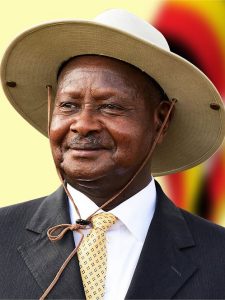
Yoweri Museveni
Same-sex relations already were illegal in Uganda, but the new law calls for life imprisonment for anyone convicted of homosexuality and mandates the death penalty for anyone convicted of “aggravated homosexuality.” That includes the transmission of HIV through gay sex with children and disabled people.
Uganda’s Parliament in March passed a harsher bill that was vetoed by Museveni. That version would have criminalized people merely for identifying as LGBTQ. The alternative law now enacted still criminalizes those who participate in same-sex acts and those who enable them.
The law has been called draconian and cruel and backward. U.S. President Joe Biden called the law “a tragic violation of universal human rights.”
Uganda already was one of 30 African nations where same-sex relations are considered criminal acts.
Reports of violence

Steven Kabuye
Already, intensified reports of violence against LGBTQ Ugandans are surfacing. One such account was reported on PBS by Steven Kabuye, co-founder of Truth LGBTQ. One of his colleagues, while closing the group’s office for the day, was attacked by rogue people that injured him badly. He almost lost his life,” Kabuye said. “And it was a homophobic attack because, in beating him, they were asking him to give out directions of where I am right now, because they directed the attack on me. They thought they would find me around.”

TIME magazine cover featuring Jacqueline Nabagesera
Similar accounts were given on the radio show and podcast “Here and Now” by Kasha Jacqueline Nabagesera, a founding mother of the LGBTQ rights movement in Uganda. Speaking with show host Deepa Fernandes, she said Ugandans are “taking the law into their own hands” in violent ways, emboldened by the new law.
“We have what they call mob justice,” Nabagesera said. “Two days ago when the law was signed, a member of the community, a transwoman, was mutilated, being undressed on the streets. And if we did not move very, very quickly, they would actually be burned to death or killed.”
Fernandes, thinking she surely had misheard that story, asked: “I just want to ask you, you said people are being undressed on the streets. Is that to determine their gender?”
Nabagesera replied: “Yes, these are people who have already been known in their communities for a long time. And so now, because of the laws, they’ve been targeted. These videos, unfortunately, are moving around all social media in Uganda. So they’re even getting more exposed, to other places where they would actually even relocate.”
“People are doing this because now they’re doing it with impunity, because now they feel that the law is on their side.”
The Ugandan activist explained: “People are doing this because now they’re doing it with impunity, because now they feel that the law is on their side. They can do whatever they want. And this is why we are seeing people burning down houses belonging to LGBT people and we are seeing people being displaced, without any regard of the law or the contracts they signed with their landlords.”
American evangelical influence
The vitriolic anti-gay sentiments that permeate Uganda today were imported there by American evangelicals, Nabagesera charged.
“We’ve had a group of American evangelical extremists coming over to Africa, Uganda especially, taking advantage of countries that need resources but also have very strong African family values,” she said.
Multiple news outlets have documented the ways American evangelicals have worked to achieve something in parts of Africa they never have been able to achieve in America: Equating homosexuality with pedophilia in an effort to scare people into bias.
According to a report in Foreign Policy, this was accomplished in part through the work of a U.S.-based evangelical radio ministry called Family Life Network that has “weaponized” mass media to promote an “ex-gay narrative” in which Africans claim to have been “lured” or “recruited” into homosexuality.
An article in Vox details how Roger Ross Williams’ 2013 film God Loves Uganda unravels the export of American evangelical anti-gay culture wars to Uganda.
Washington Post foreign affairs columnist Ishaan Tharoor recently wrote that “a slate of proselytizing, activist U.S. religious groups have for years campaigned in parts of Africa, especially in countries like Uganda, and sown the seeds for even more hardline measures there.”
“Close to half of the $54 million spent between 2007 and 2020 by American religious organizations advocating against LGBTQ rights in Africa was spent in Uganda alone.”
Tharoor reports that research by Open Democracy found “close to half of the $54 million spent between 2007 and 2020 by American religious organizations advocating against LGBTQ rights in Africa was spent in Uganda alone. They use that money to advocate for conversion therapy and convince people that people can successfully become ex-gay.”
Even the National Catholic Reporter has warned of American evangelical meddling in Africa in general and Uganda in particular.
The bottom line for many American evangelicals — particularly the most conservative of that group — is driven by a strictly literal interpretation of all Scripture, which is tied to belief in biblical inerrancy.
The Leviticus passage cited by Ascol is among six so-called “clobber passages” in the Bible used to insist homosexuality is sinful. Leviticus chapters 17 through 26 contain what biblical scholars call the Holiness Code, a lengthy set of rules for the Children of Israel intended to set them apart from other people and emphasize that separation. It includes many commands no longer practiced by most Jews and by very few Christians, such as commands about not mixing two kinds of fabric.
Critics of biblical literalists charge the literalists only take certain verses literally. The literalists counter that sexual purity is an important theme of the Bible that must still be observed.
Related articles:
Egged on by evangelical influence, Ugandan Parliament passes harsh new anti-gay bill
Ghana considers a new law punishing same-sex relations, and LGBTQ community fears reprisals
African Anglican leaders criticize Church of England over same-sex marriage decision
Focus on the Family affiliate is the unifying force behind campaign to restrict transgender rights | Analysis by Steve Rabey

